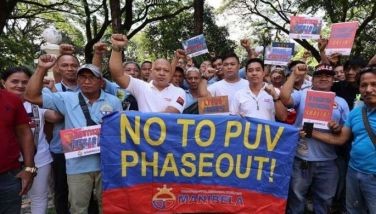Legislative roundup: Duterte's 8 priority bills and Congress' progress so far
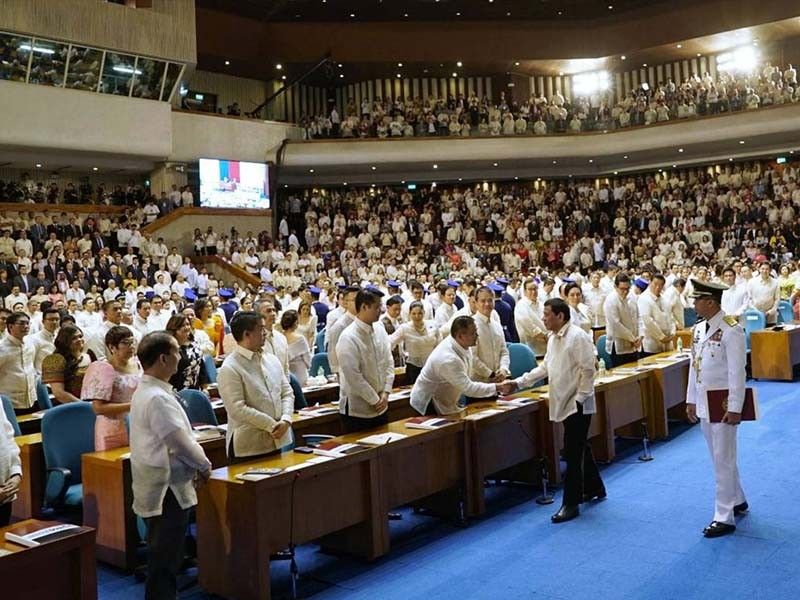
MANILA, Philippines — The annual State of the Nation Address has historically been a venue for presidents to lay out the priority measures that they want Congress to work on until through the year, and President Rodrigo Duterte's third was no different.
Although the House speaker and the Senate president have the power to make their own legislative agendas, these usually coincide with the president's.
Here's a look at the eight priority pieces of legislation that Duterte has asked Congress to pass, and the progress that each house has made on them.
Charter change and a shift to federalism
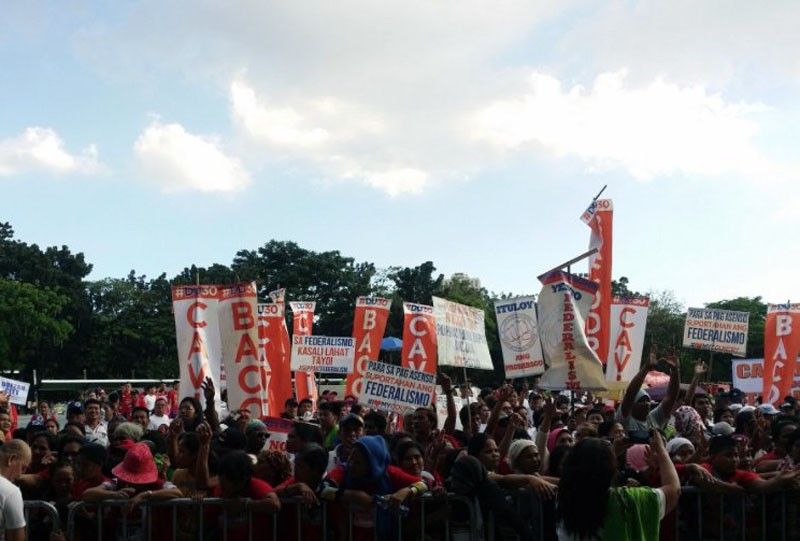
In this file photo, President Rodrigo Duterte's supporters hold a rally in Quezon City in support of federalism. The STAR/Emmanuel Tupas, File photo
A consultative committee has submitted its draft of a proposed constitution for a Federal Republic of the Philippines, which President Rodrigo Duterte, who commissioned it, is expected to endorse to Congress.
Before he was ousted as speaker on Monday, Rep. Pantaleon Alvarez (Davao del Norte) told the House of Representatives that it is time to “dismantle” the Constitution that he said has “robbed” the rest of the Philippines of its “chance to fully realize its potential for growth and development.”
The House, in January, adopted a resolution to convene as a constituent assembly to amend the 1987 Constitution.
Critics of the charter change question the motives behind the proposal and have said a change in the form of government would not work if the same officials stay in power.
Speaker Gloria Macapagal-Arroyo (Pampanga) has been pushing for charter change, particularly towards a parliamentary form of government, since she was president and as a member of the House. The House resolution in January was for a shift to a unicameral parliamentary system.
Senate President Vicente Sotto III, in his speech to open the Senate session on Monday amid rumors that charter change would be snuck in during the SONA joint assembly, said he did "not wish to preside during my watch over the necrological services of the Philippine Senate."
"The Senate is essential in any and all matters pertaining to legislation and whenever Congress is mandated to exercise some functions," he also said in response to the rumors that the Senate would be sidelined in the debate on charter change.
"As of now everything stands as a proposal. Congress is here to study [the draft federal charter]. We will study every provision. We can end up changing everything or just one or two parts of it," Sotto said in a rado interview earlier in July.
Ban on contractualization
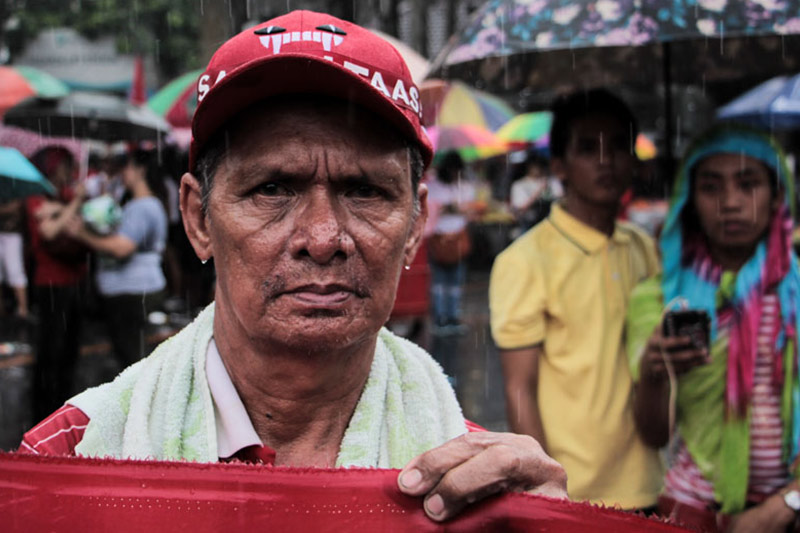
A laborer participating in the 2018 May Day protest amid a heavy downpour. Philstar.com/Efigenio Toledo IV
Putting an end to "endo" was among Duterte's campaign promises. "Endo," from "end of contract," initially referred to the practice of short-term contracts short of the six months that would make a worker a regular employee with benefits. It has since been expanded to include contractual labor in general, which, IBON think tank contributes to "the prevalence of jobs that are insecure, low-paying, and lacking in benefits."
In April, presidential spokesperson Harry Roque proclaimed that "the president had fulfilled his election promise to do away with '555 endo'" but that further action would be up to Congress.
The House has already passed a bill that protects the security of tenure of workers and prohibits sub-contracting work. It does not ban contractual labor, which employers' groups say companies need during busier seasons.
"It is impractical and costly for the enterprise to maintain workers beyond what it needs, operating in a highly competitive trade environment that requires just-in-time production," Employers Confederation of the Philippines acting president Ortiz-Luis said in June.
A counterpart bill at the Senate has already hurdled the chamber's Committee on Labor, Employment and Human Resources Development and has been pending second reading since May 29, according to the Senate's Legislative Information System.
TRAIN 2
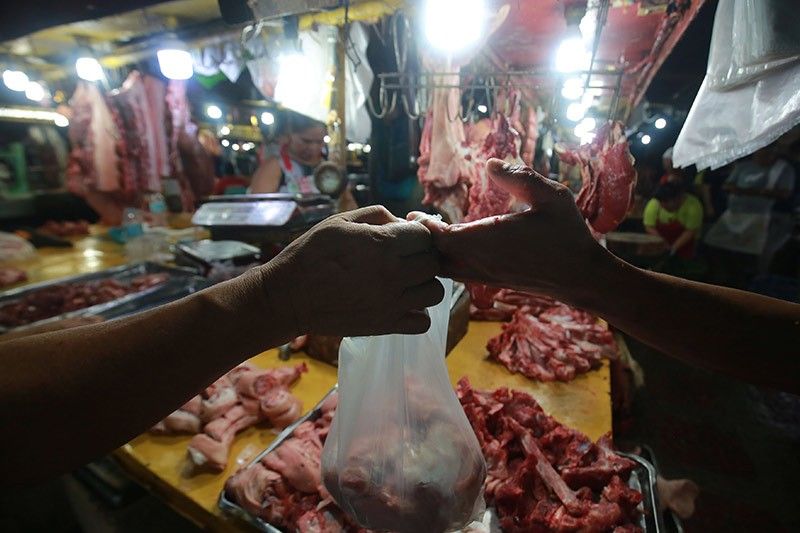
A vendor hands over chopped meat to a customer at Nepa Q Mart market in Kamuning, Quezon City. The STAR/Michael Varcas, File photo
The second package of the government's Tax Reform for Acceleration and Inclusion program, which will lower corporate income tax rates to 25 percent from 30 percent but will also streamline tax incentives, was filed at the House of Representatives in March. According to previous reports, the Finance department also wants value-added tax exemptions for coal and casinos removed.
The reforms are meant to make the Philippines more attractive to investors.
Since the Constitution requires all bills that deal with revenues and tariffs originate exclusively in the House, there is no Senate counterpart for it yet.
According to reports, however, senators are wary of sponsoring the bill. Senate Majority Leader Juan Miguel Zubiri said on Wednesday, July 25, that senators need to consider how the loss of the tax incentives may lead to investors leaving the country, which could lead to job losses.
Also on Wednesday, Sotto said senators are also wary because of the effect of the first TRAIN Law, which lowered personal income taxes but also imposed higher excise taxes on fuel and on "sin" products.
The law has been blamed for a recent rise in prices, although economic managers say the TRAIN Law is just one of the factors in the price increases that have led to a one-peso increase on public utility jeepney fares. They said that a stronger dollar and higher fuel prices abroad also affect domestic prices.
Rice tariffication

The government believes removing quantitative restrictions while imposing tariffs will lower rice prices in the long term. File photo
The National Economic and Development Authority in April reiterated the need to amend the Agricultural Tariffication Act of 1996 and replace quantitative restrictions—how much rice the Philippines can import—with a tarrif system.
"This will remove unnecessary government intervention in the rice market," NEDA said of the move to liberalize the rice importation.
The president on Monday said tarrification "will give us additional resources for our farmers, reduce the price of rice by up to P7 per kilo, and lower inflation significantly."
A Senate version of the bill that Sen. Sherwin Gatchalian in May has been referred to the Committee on Agriculture and Food. The Revised Agricultural Tariffication Act, a consolidation of several bills, has been approved at the committee level and referred to the Committee on Rules for calendaring.
National Land Use Act
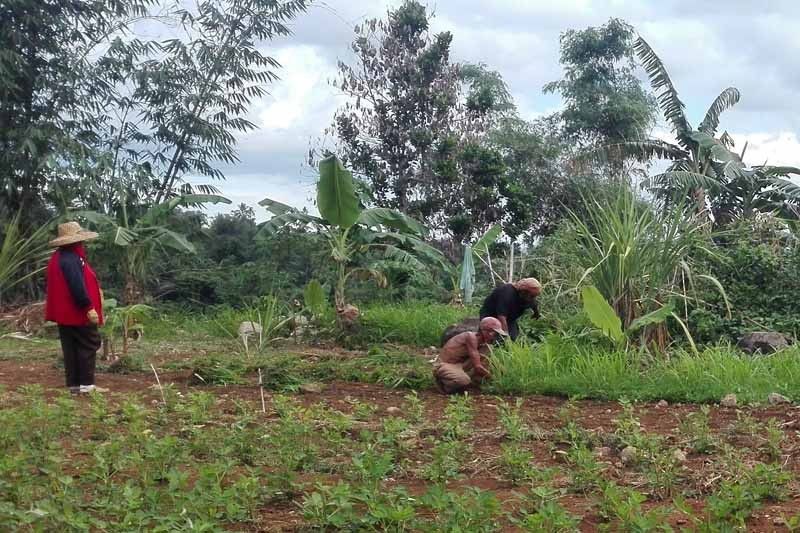
The National Land Use Law will put policies in place on how the Philippines will utilize the land that it has. File photo
Duterte used the situation in Boracay — which has been closed to tourists since late April for rehabilitation — to illustrate "the need to rationalize [in a] holistic, sustainable manner, the utilization, management and development of our lands."
He has repeatedly stressed that the island, which hosts hotels, resorts and developments is classified as forestal and agricultural land has not been declared a tourism zone.
"I urge the Senate to urgently pass the National Land Use Act to put in place a national land use policy that will address our competing land requirements for food, housing business, and environmental conservation," he said in his third SONA.
The House of Representatives has already passed its version of the bill but it has been pending at the Senate since July 31, 2017, a few days after it was filed by Zubiri.
The bill, if passed into law, will have the national and local governments "determine the specific uses of land and other physical resources" in the country.
Among its provisions is the full protection from conversion to other purposes of "irrigable lands, all lands developed or possessing the potential for development of high value crops, and all agricultural lands that are ecologically fragile and whose conversion will result in serious environmental problems."
Department of Disaster Management
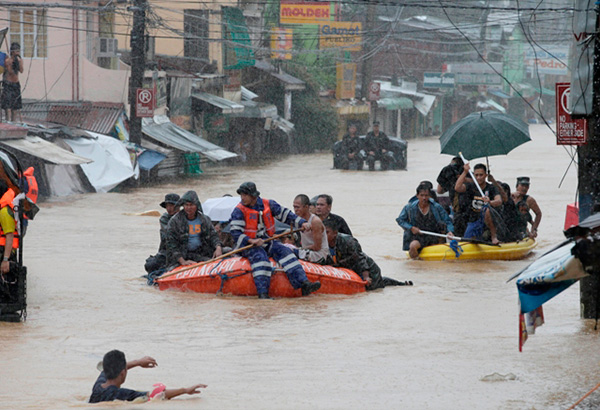
President Rodrigo Duterte said the Philippines might need an agency like the US Federal Emergency Management Agency. File photo
Bills at the Senate to replace the National Disaster Risk Reduction and Management and the Office of Civil Defense with a department that will "prepare, integrate, coordinate, implement, supervise, control, monitor, and evaluate all plans, programs, projects, and activities of the government on humanitarian emergency assistance and disaster risk reduction and management" are pending at the Committee on National Defense and Security
"The experience of the Philippines in 2013 when the country was struck with super typhoon Yolanda exposes the gaps in the policies of the government in
terms of disaster preparedness, mitigation, response and rehabilitation," Sen. JV Ejercito, who filed his bill in August 2017, said in his explanatory note.
Counterpart measures at the House have been pending at the committee level since 2016.
In his SONA, Duterte batted for the creation of the new department, saying "we need a truly empowered department characterized by a unity of command, science-based approach and full-time focus on natural hazards and disasters, and the wherewithal to take charge of the disaster risk reduction; preparedness and response; with better recovery and faster rehabilitation."
Coconut Levy Trust Fund

The "coco levy" collected from farmers was supposed to be used to develop the coconut industry. File photo
A bicameral conference committee will meet to reconcile versions of bills creating a P100-billion trust fund for the coco levy funds—taxes imposed on coconut farmers by Presidential Decree 755 in 1975.
"It will not be very difficult to convince our colleagues to agree on provisions that will make sure that benefits from the coconut levy fund will be protected, maximized and will directly go to the 3.5 million coconut farmers themselves," Sen. Cynthia Villar, chair of the Senate Committee on Agriculture and Food, said in a press statement.
Among the provisions in the Senate version are limiting the investment of the trust fund "in Philippine government securities to ensure the safety of the fund and for assured returns."
Income from the trust fund will go to shared facilities programs, scholarships, support for farmer groups and cooperatives, and to farm improvements.
Universal Health Care

The Universal Health Care bill is meant to give Filipinos "access to a comprehensive set of health services, the cost of which will not cause financial hardship." File photo
The House approved a Universal Health Care bill in September 2017 "to require all citizens of the Philippines to enroll in the National Health Security Program."
The program is meant to give Filipinos "access to a comprehensive set of health services, the cost of which will not cause financial hardship."
Meanwhile,a bill to "[expedite] the attainment of universal healthcare by providing coverage to all Filipinos to eventually close the gap from the current 92% to 100%" has been pending at the Senate Committee on Health and Demography since June 30, 2016.
"We shall pool all our resources for health services under the [PhilHealth]; institutionalize primary care as a prerequisite to access higher level of healthcare; and supplement human resource gaps of the LGUs through a National Health Workforce Support System," the president said Monday. — Jonathan de Santos
- Latest
- Trending






















